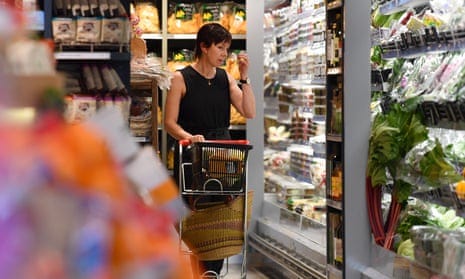My latest in The Guardian Supermarkets are the public face of inflation. Every time we go shopping, we are reminded that just about everything costs more than it did before Covid. And shrinkflation, once subtle and insidious, has become blatant. A standard chocolate bar is now what used to be called “fun size”. A natural response, particularly for politicians seeking to divert attention from themselves, is to blame greed and monopoly power. Explanations based on greed are rather naive. Corporate executives are paid by shareholders to be greedy – that is, to maximise profit subject to a somewhat hazy concept of “social licence” regarding the treatment of customers, employees and other stakeholders. And there is no reason to think that Coles and Woolworths were any less greedy
Topics:
John Quiggin considers the following as important: Uncategorized
This could be interesting, too:
tom writes The Ukraine war and Europe’s deepening march of folly
Stavros Mavroudeas writes CfP of Marxist Macroeconomic Modelling workgroup – 18th WAPE Forum, Istanbul August 6-8, 2025
Lars Pålsson Syll writes The pretence-of-knowledge syndrome
Dean Baker writes Crypto and Donald Trump’s strategic baseball card reserve
Supermarkets are the public face of inflation. Every time we go shopping, we are reminded that just about everything costs more than it did before Covid. And shrinkflation, once subtle and insidious, has become blatant. A standard chocolate bar is now what used to be called “fun size”. A natural response, particularly for politicians seeking to divert attention from themselves, is to blame greed and monopoly power.

Explanations based on greed are rather naive. Corporate executives are paid by shareholders to be greedy – that is, to maximise profit subject to a somewhat hazy concept of “social licence” regarding the treatment of customers, employees and other stakeholders. And there is no reason to think that Coles and Woolworths were any less greedy before the arrival of the pandemic than after.
Australia’s cost-of-living crisis isn’t about the price of groceries. It’s about wealth distribution
The role of monopoly power is a bit more complex. Coles and Woolworths dominate the market, but if anything their dominance has eroded in recent years as Aldi’s market share has grown. However, their capacity to benefit from market power was increased by strong growth in demand after the end of lockdowns. Under conditions of strong demand, firms with market power can pad their profit margins and amplify inflation, as appears to have occurred in this instance.
The big problem with the supermarket sector is not monopoly but the monopsony (the technical term for a market dominated by one, or a few, buyers) power of supermarkets who can push down the prices and terms they offer to their suppliers. The mandatory code of conduct proposed after a review by Dr Craig Emerson might help to address these problems.
What about divestiture? Perhaps mistaking the late Joseph Stalin for a trustbuster, Anthony Albanese has described this as a “Soviet” option. In fact, forced divestiture is a standard feature of competition policy internationally, available in such distinctly non-Soviet countries as the US and UK.
Nevertheless, divestiture is unlikely to be the right remedy for the problems of the supermarket sector. Most people have only one or two supermarkets in easy reach, and splitting Coles and Woolworths into two or more competing businesses wouldn’t change that. The problems of dealing with suppliers are better dealt with through conduct measures rather than a breakup. The only obvious targets for divestiture are the liquor businesses and the loyalty programs (Flybuys and Everyday Rewards).
But there are other parts of the Australian economy where divestiture powers could be a useful tool for competition policy. Perhaps the most notable example is that of airlines. The Sydney-Melbourne-Brisbane “golden triangle” comprises three of the busiest city-pair routes in the world, and ought to be fiercely competitive. But a single corporation, Qantas, holds more than 60% of the market under its own name and through its wholly owned subsidiary Jetstar.
There are many factors contributing to Qantas’s dominance. These include control of crucial slots and cabotage rules restricting international competition. And Qantas has received favourable treatment reflecting residual goodwill from its historical role as the national flag carrier (much eroded by the Joyce era, but still present).
But the ownership of Jetstar as a “flanker” or “fighter” brand is at least as important. Wikipedia notes that flankers are “lower-priced offerings launched by a company to take on, and ideally take out, specific competitors”, and the first example listed is that of Qantas. Forcing divestment would yield an immediate increase in competition in the airline market.
Another candidate for divestiture is Transurban, the owner of most of Australia’s privatised toll roads. Here the main issue is not competition per se, since toll roads in different locations don’t compete with each other, but the political power associated with having a single company control so much of our transport infrastructure.
It is now becoming clear that the deals that have greatly enriched Transurban shareholders have been a disaster for motorists and for coherent urban planning. The solution, as others have argued, could be to take these roads back into public ownership and redo road pricing from scratch. A breakup of Transurban into separate state-level businesses would be a first step.
Big business in Australia faces less competition than almost anywhere in the world and likes it that way. The era of privatisation and “light-handed” regulation has only made matters worse. Turning the situation around will require a full set of policy tools, including conduct measures, divestiture and, in some cases, a return to public ownership.
